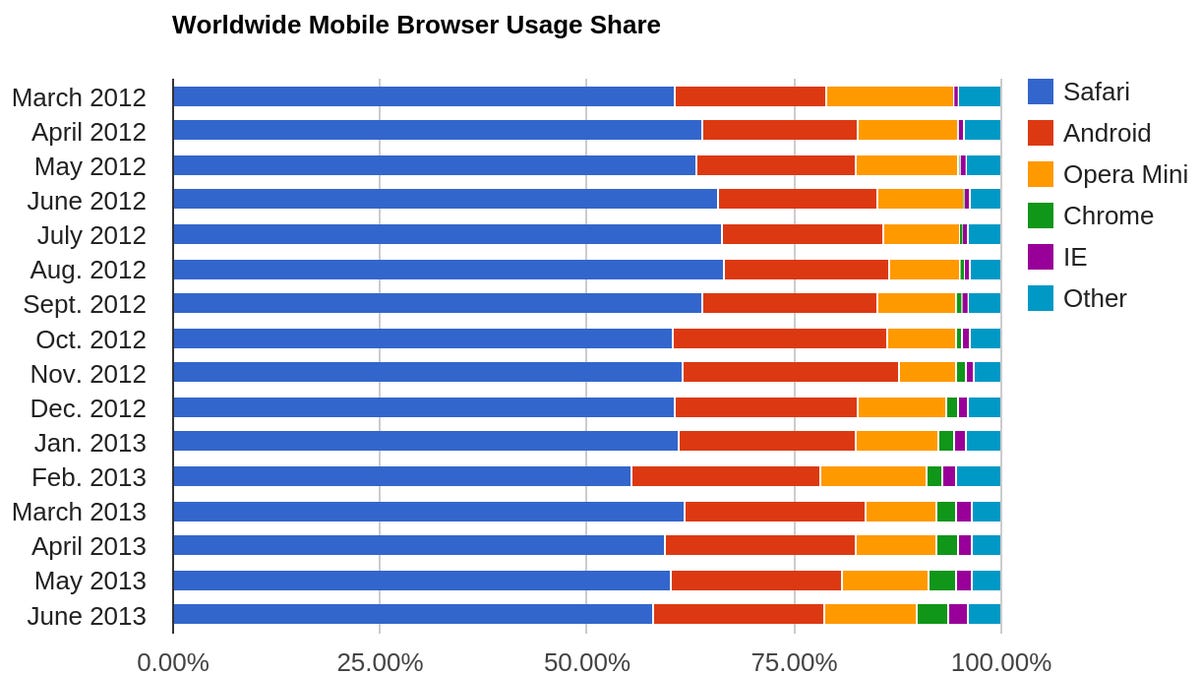Rival mobile browsers chip away at Safari's lead
Opera Mini, Chrome, and Internet Explorer each gained some share of mobile-browser usage in June at the expense of Apple's leading Safari. Also: on PCs, Chrome cuts into Firefox share.

Safari, the top browser in terms of mobile usage, lost a little share to three rivals in June.
The Apple browser dropped from 60.0 percent of usage in May to 58.0 percent in June, still well ahead of competing browsers, according to statistics released by tracking firm Net Applications on Monday. Google's unbranded Android browser, in second place, also dipped, from 20.7 percent to 20.6 percent.
Picking up the slack were Opera Mini, which rose from 10.5 percent to 11.2 percent; Google's Chrome, which rose from 3.2 percent to 3.8 percent; and IE, which rose from 2.0 percent to 2.4 percent, Net Applications said.
Mobile browsing is a more volatile market than browsing on the PC, where trends are slower to shift. In the mobile world, where browsing often is sluggish, a lot of software development activity concentrates on writing native apps rather than on Web apps.
Net Applications bases its data on visits to a network of Web sites using its analytics software, counting a browser if an individual uses it once on a day and attempting to correct for country-by-country usage differences between its own network and actual global Web traffic.
For browsing with personal computers, IE extended its lead from 56.0 percent in May to 56.2 percent in June. Firefox dropped, from 20.6 percent to 19.2 percent, while Chrome rose from 15.7 percent to 17.2 percent.
Net Applications added a new factor in its measurements. Starting in with the June 2013 statistics, the company started discarding "hidden pages" such as tabs opened previously that are reopened during a browser relaunch, but that are not viewed again. "A percentage of the background tabs are never viewed by the user and therefore should not be used to measure usage share," Net Applications said in an FAQ.
For June 2013, Net Applications classified 6.4 percent of Firefox page views as hidden pages, with Opera was close behind at 6.3 percent and Chrome at 5.6 percent. IE was much lower, at 0.7 percent, and Safari was at 0.2 percent.
Net Applications already screened out a different type of page view used in Chrome, "prerendering," in which a browser loads a Web page in anticipation that a person might want to view it. However, Net Applications disclosed just how often Chrome prerenders pages: 12.1 percent of page loads.
That figure suggests that Google prizes fast page loads over network usage that turns out never to ever produce a real page view. If a prerendered page is viewed, it counts as a legitimate page view in the statistics.
Mobile browsing accounts for only a small fraction of overall browsing, but it's gradually expanding as people spend more time with smartphones and tablets.
Mobile browsing accounted for 11.4 percent of overall browsing, while PC browsing was 88 percent, Net Applications said.
Another analytics firm, StatCounter, captures data with a different methodology, counting every page view and not correcting for country-by-country differences. Its statistics show Chrome in the No.1 place overall and extending its lead, with Microsoft slumping at the same time and Firefox holding mostly level.
That difference over Net Applications' data could be explained in part by greater daily usage on the part of Chrome users, because Net Applications measures browser users while StatCounter measures browser usage.

